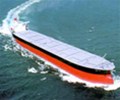Blackout halts Ukraine’s largest standalone steelworks

Ukraine’s largest standalone steelworks ArcelorMittal Kryvyi Rih said Nov. 24 it had to suspend production because of widespread blackouts across the country following Russian missile strikes on power infrastructure Nov. 23, with industrial enterprises across the country also forced to halt, according to sources.
ArcelorMittal Kryvyi Rih restricted electricity consumption and suspended most production processes following the attacks on critical infrastructure in the country, which caused power cuts at ArcelorMittal’s two iron ore open pits and its iron ore underground mine, all in Kryviy Rih, amongst other facilities.
All 106 miners who were underground when the blackout started had been safely brought to the surface, the company said.
Currently available power supply was not enough to support production even at 20% capacity, the steel producer said.
ArcelorMittal Kryvyi Rih temporarily stopped steel smelting and production of rolled products. Only coke batteries Nos. 5 and 6 remain in operation with batteries Nos. 3 and 4 and blast furnace No. 6 being put on a standby mode.
The company said it aimed to restart operations at the steelworks as soon as engineers are able to restore Ukraine’s energy infrastructure.
Ukraine has suffered widespread blackouts since around 5 pm local time Nov. 23 after missile strikes on power infrastructure, forcing industrial plants across the country to shut down, according to a source at another steel mill.
“Electricity supply has since been restarted, but remains barely enough to light some of the households,” the person said.
“Major power generation facilities – nuclear power stations, which cover 40% of Ukraine’s energy needs – remain intact and could operate normally, but as distribution stations were knocked out their power cannot be distributed, cannot reach most of the end users, including factories and plants. Water supply is distorted too,” the source said.
Speaking specifically of steel mills, even those carrying out rolling operations only, they cannot use emergency generators as a short-term rescue solution, according to the source. “A steel rolling shop may need up to 15 MW, while a backup generator will consume 100 litres/hour of diesel to supply only 500 KW, which will keep lights on in the office, but not much more than that,” the source said adding that maybe textile manufacturers can sustain for a short while on backup generators, but never a steel mill.
Source: Platts

 Hellenic Shipping News Worldwide Hellenic Shipping News Worldwide, Online Daily Newspaper on Hellenic and International Shipping
Hellenic Shipping News Worldwide Hellenic Shipping News Worldwide, Online Daily Newspaper on Hellenic and International Shipping





















 PG-Software
PG-Software